© 2014-

CAMPAIGN GROUPS
The offshore stations were incredibly popular and although it was widely expected that eventually the Government would legislate to prevent them operating, continued procrastination over the introduction of such legislation meant that there were no listener support organisations established who could oppose any attempts to outlaw the stations.
This only happened about the time that the Marine etc Broadcasting (Offences) Bill received its Second Reading in the House of Commons in February 1967 -
First of these groups to be established was the Commercial Radio Listeners Association (CRLA) which was launched on January 29th, 1967 by Catherine Baker to fight to prevent the passing of the Marine Offences Bill.
Three weeks later, on February 19th, 1967, at a meeting in London attended by representatives of many offshore stations, the Free Radio Supporters Association (FRSA) was formed. The radio stations’ representatives agreed that they would help the Association in any way they could, short of providing finance or being represented on its governing committee. In practice this meant broadcasting 'commercials' and announcements on behalf of the Association urging listeners to 'join the fight for free radio'.
The CRLA and the FRSA soon merged and, following notification from Ronan O'Rahilly that Radio Caroline would only carry announcements if the word 'supporters' was dropped from its title, the organisation became known as the Free Radio Association (FRA). Announcements for the FRA were broadcast on most of the remaining offshore stations advertising a range of publicity material -
soon merged and, following notification from Ronan O'Rahilly that Radio Caroline would only carry announcements if the word 'supporters' was dropped from its title, the organisation became known as the Free Radio Association (FRA). Announcements for the FRA were broadcast on most of the remaining offshore stations advertising a range of publicity material -
The FR A needed a strong voice, which it found in Glasgow property developer Sir Ian MacTaggart, who became the organisations’ President. Multi-
A needed a strong voice, which it found in Glasgow property developer Sir Ian MacTaggart, who became the organisations’ President. Multi-
Chairman of the FRA was Geoffrey Pe arl (left).
arl (left).
The Free Radio Association collected thousands of signatures from supporters for a petition which stated:-
"The Free Radio Association is fighting for free speech, free enterprise and free choice. The Government is trying to crush all competition over the air by silencing the commercial stations -
Another supporters' organis ation which received publicity on the offshore stations was the Broadside Free Radio Movement, formed by Cambridge University student Peter Philipson in April 1967, recruiting initially from the two universities of Oxford and Cambridge. In June the headquarters of the organisation was moved to London and national recruitment began following publicity on Radio Caroline.
ation which received publicity on the offshore stations was the Broadside Free Radio Movement, formed by Cambridge University student Peter Philipson in April 1967, recruiting initially from the two universities of Oxford and Cambridge. In June the headquarters of the organisation was moved to London and national recruitment began following publicity on Radio Caroline.

The Broadside Free Radio Movement issued a statement outlining its policy and objectives:-
"Broadside Free Radio Movement" is an independent movement, run by Peter Phillipson, objecting to the "Marine &c, Broadcasting, (Offences) Bill, which prohibits British firms placing advertising copy with offshore radio stations, and British subjects from working on them, with the intention of forcing them to close down. In order to do this, the Act incorporates the use of methods which are completely alien to the age-
""We intend to establish a network of "Action Centres," each responsible for voicing agitation is their area. This will be run by unpaid volunteers, who will hold meetings, canvass, distribute literature, and attempt to persuade people to withhold their support from Parliamentary candidates and MP's who back the "Marine etc. Bill". In this way we intend to stir up public feeling to such an extent that the "Act" will fall in its objective."
The organisation’s objectives were:-
- To give a coherent and visible organisation to the many millions of people in this country who are directly opposed to the Government's Marine Broadcasting Offence Bill.
- To give to these people a framework within which their protest can take on a more unitary, and united form, and thus, it is hoped, a more effective one.
- To expose what the movement considers to be the completely inadequate arguments that the Government has put forward to account for the action that hey have taken, and are still in the process of taking against the pioneers of independent broadcasting in this country.
- To support the whole concept of a free and completely independent system of sound broadcasting here, both on a national and a local scale, and thus by implication, to oppose any attempt to return to the air networks of this country to a monopoly control.
By July the Movement claimed a membership of 80,000 but by October it had collapsed totally with financial debts of £500. The Free Radio Association took over the outstanding debts and combined Broadside's membership with its own creating an organisation with a claimed membership of more than 100,000.
Two of the offshore stations, Radio London and Radio 270, also mounted their own campaigns against the proposed legislation - y writing to their MPs
y writing to their MPs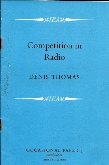 , while Radio 270 followed a similar pattern and also published, in conjunction with the Institute of Economic Affairs, a booklet entitled Competition in Radio, by Denis Thomas. This traced the development of commercial radio abroad as well as in Britain and concluded by supporting the introduction of a legal commercial radio system.
, while Radio 270 followed a similar pattern and also published, in conjunction with the Institute of Economic Affairs, a booklet entitled Competition in Radio, by Denis Thomas. This traced the development of commercial radio abroad as well as in Britain and concluded by supporting the introduction of a legal commercial radio system.

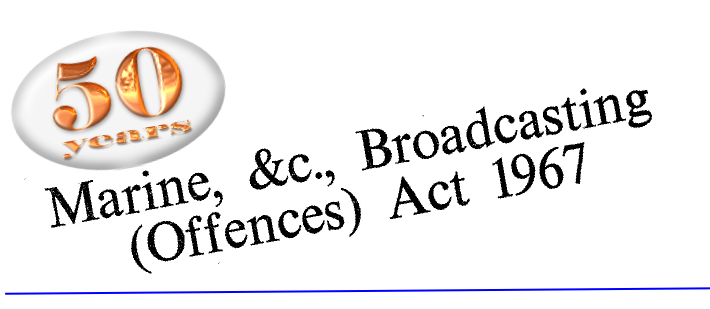
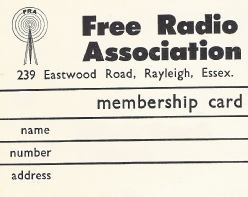
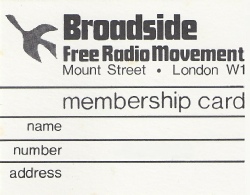

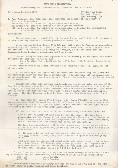
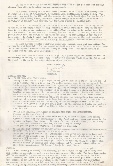
FRA Welcome letter sent to new members.
Click to enlarge
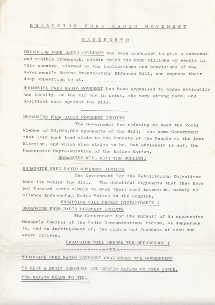
Broadside’s Manifesto
Click to enlarge



Ground
Back to








